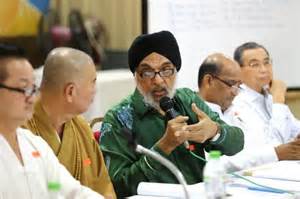NSC Bill about power, not security, interfaith group says
(Malay Mail Online) – The absence of a tangible security policy to accompany the National Security Council Bill 2015 belies the government’s insistence that the proposed law was meant to safeguard the country’s safety, said an interfaith group today.
The Malaysian Consultative Council on Buddhism, Christianity, Hinduism, Sikhism and Taoism (MCCBCHST) pointed out that despite national security being the main thrust of the Bill, the proposed law does not attempt to communicate how the powers will be used to safeguard the country’s safety.
The umbrella body for the country’s non-Muslim religions also echoed concerns by other critics who said the Bill would usurp authority of the Yang di-Pertuan Agong to declare a state of emergency and transfer this to the National Security Council headed by the prime minister.
“A further objection to the NSC Bill is that it has over-focussed on empowering the prime minister and the drafters of the Bill appear to have completely forgotten to require the NSC to produce a National Security Policy.
“It is understood that the Malaysian government has not produced any document on National Security Policy until today,” the group said in a statement.
Given the open-ended nature of the NSC Bill and the absence of a clear policy on national security, the group said that the council must be enlarged to ensure representation from Barisan Nasional components aside from Umno and from the east Malaysian states, it added.
In the NSC Bill’s present form, the composition of ministers in the proposed council include the prime minister, deputy prime minister, home minister, defence minister, and multimedia and communications minister — all of whom are currently from Umno.
The MCCBCHST today also insisted that the ability of the judiciary to review the NSC Bill must not be eliminated, saying that no single body must be allowed to wield powers as extensive as those proposed without sufficient checks and balances.
The NSC Bill was passed on December 3 amid protests by the opposition and civil society groups against what they claim is a law that would confer far-reaching powers to the prime minister and set Malaysia on a path towards dictatorial rule.
The proposed law would allow security personnel to disregard written laws and constitutional rights within “security areas” declared by the council, theoretically allowing killings to go un-investigated if a magistrate is convinced they were done in the execution of the security personnel’s duties.
Putrajaya insists that the law will not be used against political dissent and was aimed purey at countering threats against “national security” that was loosely defined as including socio-political harmony.
The NSC Bill is currently awaiting approval by the Dewan Negara.


